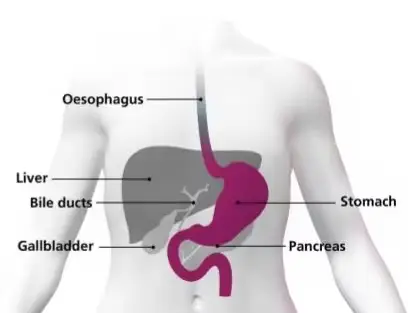Stomach cancer (also called gastric cancer) occurs when abnormal cells in the stomach start to divide and grow in an uncontrolled way.
The stomach is a stretchy, muscular bag that stores food and helps break it down through digestion. It is situated in the upper left-hand side of the tummy (abdomen) area. The stomach is part of the digestive system, sometimes called the gastro-intestinal or GI tract.

There are many possible symptoms of stomach cancer, but they might be hard to spot. They can however, often affect your digestion.
The most common symptoms include:
- heartburn or acid reflux
- difficulty swallowing
- indigestion, including burping a lot
- feeling or being sick
- feeling full very quickly when eating
- loss of appetite or losing weight without trying to
- a lump or pain at the top of your tummy
The most common type of stomach cancer is adenocarcinoma, which develops in the glandular cells of the stomach lining.
Other types of stomach cancer include:
- soft tissue sarcomas, i.e. gastro-intestinal stromal tumours (GISTs)
- lymphomas
- neuroendocrine tumours
Treatment for stomach cancer at CUH
The treatment you have depends on several factors, which include:
- the type and size of the cancer
- where the cancer is located in the stomach
- your general health
- whether the cancer has spread
A team of specialists at CUH will meet to discuss your condition and to make a recommendation about the best possible treatment for you.
You, along with your clinician, will then discuss your treatment recommendations at the clinic appointment and decide on the right treatment plan for you. Your clinician will explain the different treatment options and possible side effects.
Stomach cancer is often treatable, but can be difficult to treat.
The treatment for stomach cancer can include:
- surgery
- systemic therapy
- radiotherapy
- targeted therapy
- immunotherapy
You may be able to have surgery to remove cancer, if your stomach cancer is found early and it has not spread. Surgery will remove part or all of the stomach. The surgeon may also need to remove parts of other organs around the stomach. Recovery from surgery to treat stomach cancer can take a long time.
At times, you may require more than one treatment or a combination of different treatments to give the best chance of long-term cure. For some patients, treatment may be given with the aim of curing the cancer. For others, to help control the cancer, prolong life and improve symptoms. Your clinical team will discuss with you what to expect.

